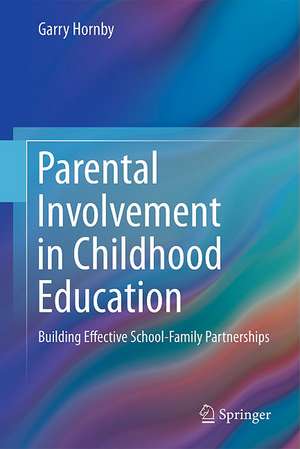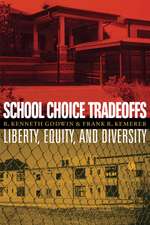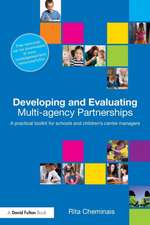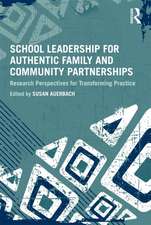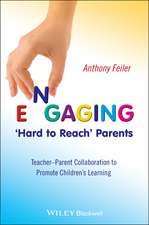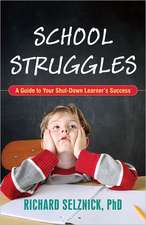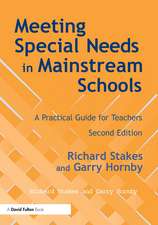Parental Involvement in Childhood Education: Building Effective School-Family Partnerships
Autor Garry Hornbyen Limba Engleză Paperback – 20 apr 2011
The author’s starting point is the gap between the ideals found in the literature and the reality of parental involvement in schools. An ecological analysis identifies professional, institutional, and societal factors that keep schools and parents distant. Methods for evaluating parental involvement are detailed, as is a model for developing and maintaining strong parental relationships at the instructor, school, and education system level, with an emphasis on flexible communication and greater understanding of parents’ needs. This empirically sound coverage offers readers:
- A detailed understanding of obstacles to parental involvement.
- An evidence-based model for parental participation.
- A three-nation study of parental involvement practices in schools.
- Guidelines for implementing parental involvement activities and initiatives.
- A review of effective communication strategies with parents.
- Analysis of key interpersonal skills for effective work with parents.
Preț: 577.07 lei
Preț vechi: 678.91 lei
-15% Nou
Puncte Express: 866
Preț estimativ în valută:
110.45€ • 114.87$ • 92.56£
110.45€ • 114.87$ • 92.56£
Carte tipărită la comandă
Livrare economică 14-28 martie
Preluare comenzi: 021 569.72.76
Specificații
ISBN-13: 9781441983787
ISBN-10: 1441983783
Pagini: 137
Ilustrații: XIV, 137 p.
Dimensiuni: 155 x 235 x 10 mm
Greutate: 0.23 kg
Ediția:2011
Editura: Springer
Colecția Springer
Locul publicării:New York, NY, United States
ISBN-10: 1441983783
Pagini: 137
Ilustrații: XIV, 137 p.
Dimensiuni: 155 x 235 x 10 mm
Greutate: 0.23 kg
Ediția:2011
Editura: Springer
Colecția Springer
Locul publicării:New York, NY, United States
Public țintă
Professional/practitionerRecenzii
From the reviews:
“This book is a concise yet comprehensive guide in building partnerships between parents and teachers, increasing parental involvement in their children’s education. … I found this book to be very helpful in addressing the factors in building effective partnerships between families and schools. … Individuals working in the school system would benefit from reading this book as it presents many ideas that could be easily implemented in their practice and potentially reap great results.” (Sandra E. James, Journal of Child and Family Studies, Vol. 21, 2012)
“This book is a concise yet comprehensive guide in building partnerships between parents and teachers, increasing parental involvement in their children’s education. … I found this book to be very helpful in addressing the factors in building effective partnerships between families and schools. … Individuals working in the school system would benefit from reading this book as it presents many ideas that could be easily implemented in their practice and potentially reap great results.” (Sandra E. James, Journal of Child and Family Studies, Vol. 21, 2012)
Notă biografică
Garry Hornby (BSc, BA, MA, Dip.Ed.Psych. Ph.D, CPsychol., FBPsS) is a professor of educational psychology in the College of Education at the University of Canterbury in Christchurch, New Zealand. He is a chartered educational and counselling psychologist, and fellow of the British Psychological Society.
Professor Hornby was born in England and completed a degree in physics at the University of Leeds. His first job was as a counselor in a residential school for emotionally disturbed children in the USA. He then worked as a secondary school teacher in England and New Zealand. From there he went on teach a special class for children with moderate learning disabilities and subsequently trained and worked as an educational psychologist in Auckland. He worked as a teacher educator at the Auckland College of Education before returning to England to work as a lecturer and researcher at the Universities of Manchester and Hull for fifteen years. He lectured for two years at the University of the West Indies in Barbados before moving to Christchurch, New Zealand, where he has been for eight years. He is married to a Barbadian and has two secondary school age sons.
His teaching and research is in the areas of educational psychology, special education, counselling, teacher education and parental involvement in education. His previous publications include: Counselling in Child Disability (Chapman and Hall, 1994); Improving Parental Involvement (Cassell, 2000); Mental Health Handbook for Schools (Routledge. 2002); Counselling Pupils in Schools: Skills and Strategies for Teachers (Routledge, 2003); Meeting Special Needs in Mainstream Schools (2nd ed.) (David Fulton, 2000).
Professor Hornby was born in England and completed a degree in physics at the University of Leeds. His first job was as a counselor in a residential school for emotionally disturbed children in the USA. He then worked as a secondary school teacher in England and New Zealand. From there he went on teach a special class for children with moderate learning disabilities and subsequently trained and worked as an educational psychologist in Auckland. He worked as a teacher educator at the Auckland College of Education before returning to England to work as a lecturer and researcher at the Universities of Manchester and Hull for fifteen years. He lectured for two years at the University of the West Indies in Barbados before moving to Christchurch, New Zealand, where he has been for eight years. He is married to a Barbadian and has two secondary school age sons.
His teaching and research is in the areas of educational psychology, special education, counselling, teacher education and parental involvement in education. His previous publications include: Counselling in Child Disability (Chapman and Hall, 1994); Improving Parental Involvement (Cassell, 2000); Mental Health Handbook for Schools (Routledge. 2002); Counselling Pupils in Schools: Skills and Strategies for Teachers (Routledge, 2003); Meeting Special Needs in Mainstream Schools (2nd ed.) (David Fulton, 2000).
Textul de pe ultima copertă
Parental participation has long been recognized as a positive factor in children’s education. Research consistently shows that parents’ contributions to their children’s education lead to improvements in their academic and behavioral outcomes, from elementary through middle and secondary school. Recognizing the critical role of school psychologists in this equation, Parental Involvement in Childhood Education clearly sets out an evidence-based rationale and blueprint for building parental involvement and faculty awareness.
The author’s starting point is the gap between the ideals found in the literature and the reality of parental involvement in schools. An ecological analysis identifies professional, institutional, and societal factors that keep schools and parents distant. Methods for evaluating parental involvement are detailed, as is a model for developing and maintaining strong parental relationships at the instructor, school, and education system level, with an emphasis on flexible communication and greater understanding of parents’ needs. This empirically sound coverage offers readers:
The author’s starting point is the gap between the ideals found in the literature and the reality of parental involvement in schools. An ecological analysis identifies professional, institutional, and societal factors that keep schools and parents distant. Methods for evaluating parental involvement are detailed, as is a model for developing and maintaining strong parental relationships at the instructor, school, and education system level, with an emphasis on flexible communication and greater understanding of parents’ needs. This empirically sound coverage offers readers:
- A detailed understanding of obstacles to parental involvement.
- An evidence-based model for parental participation.
- A three-nation study of parental involvement practices in schools.
- Guidelines for implementing parental involvement activities and initiatives.
- A review of effective communication strategies with parents.
- Analysis of key interpersonalskills for effective work with parents.
Caracteristici
Based on a well-established theoretical model of PI developed by the author Includes a comprehensive, current review of the research conducted with schools on the types of PI they find most useful Offers an international perspective, using examples from several countries Highlights practical implications for school psychologists and other mental health and education professionals who work within schools
